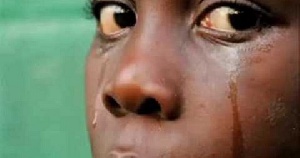 Media should always adhere to the Child Protection Code of ethics on exposure of abused children
Media should always adhere to the Child Protection Code of ethics on exposure of abused children
The United Nations Children Fund (UNICEF) has implored the media to be circumspect in their reportage on issues involving children in order not to infringe on their rights.
He said the media should always adhere to the Child Protection Code of ethics and avoid public exposure of abused children when reporting such cases.
Mrs Offeibea Baddoo, the Communication Officer of UNICEF-Ghana, who made the call, said the media had a key role to play in the campaign against child abuse as a civic responsibility.
Mrs Baddoo was addressing selected journalists from the Ashanti, Bono, Bono East, and Ahafo regions at a training workshop on Ethical Reporting and Child Online Safety, organised by UNICEF-Ghana at Fumesua near Ejisu in the Ashanti Region.
It was to expose participants to the reckless abuse of children online and build their capacities on ethical reporting on child-related issues.
Mrs Baddoo said abused children were already in delicate situations and required support to recover from their trauma. However, it was worrying that reports on such cases in the media sometimes only worsened their plight, she said.
Giving clues of locations as well as publishing pictures of victims of child abuse were infractions that could potentially subject victims to public ridicule and this could also psychologically affect their development, Mrs Baddoo said.
She, therefore, entreated the participants to always guard against identifying children in their reportage unless it was demonstrably in the public interest.
Mr Michael Abiaw, the Senior Programmes Officer, Ministry of Gender, Children and Social Protection, said reports of violence against children at the Domestic Violence and Victims Support Unit (DOVVSU) and the Commission on Human Rights and Administrative Justice (CHRAJ), continued to rise despite national response to tackle the menace.
He said about two million children were involved in child labour with as many as 31,480 abandoned by their parents in the last six years.
He said violence against children predominantly occurred in homes and schools in the form of physical, emotional, sexual abuses as well as commercial exploitations.
Mr Abiew said the media most often did not follow up on stories of child abuse after the first publication, adding that continuous coverage of such cases was critical to getting justice for the victims.
He said the Ministry was taking steps to amend existing laws to make specific reference to child sexual exploitations, child online safety and pornography.
Dr Nana Kofi Annan, Child Online Protection, National Cyber Security Centre, said Ghana was ranked ninth in global social media usage, making the country more vulnerable to risks.
He said two out of every 10 children or adolescents in Ghana had met someone in person that they first got to know on the internet.
Additionally, four out of 10 children had seen sexual images online and also accepted friend requests made to them by people they had never met before.
Dr Annan described the situation as dangerous since it exposed them to all forms of risks and advised parents to censure the devices of their children to ensure their safety online.